- Home
- Amin Maalouf
The Disoriented
The Disoriented Read online
-
One night, a phone rings in Paris
Adam learns that Mourad, once his closest friend, is dying. He quickly throws some clothes in a suitcase and takes the first flight out, to the homeland he fled twenty-five years ago. Exiled in France, Adam has been leading a peaceful life as a respected historian, but back among the milkwhite mountains of the East his past soon catches up with him. His childhood friends have all taken different paths in life—and some now have blood on their hands. Loyalty, identity, and the clash of cultures and beliefs are at the core of this long-awaited novel by the French-Lebanese literary giant Amin Maalouf.
-
Praise for The Disoriented
“There are novels which reverberate long after you’ve finished reading them. Amin Maalouf’s The Disoriented is such a novel. This is a voyage between the Orient and the West, the past and the present, as only the 1993 Goncourt Prize winner knows how to write it.”
Le Figaro
“Maalouf writes intriguing novels of exceptional quality.”
NRC Handelsblad
“Amin Maalouf gives us a perfect look at the thoughts and feelings that can lead to emigration. One can only be impressed by the magnitude and the precision of his introspection.”
Le Monde des Livres
“Maalouf’s new book, The Disoriented, marks his return to the novel with fanfare. It is a very endearing book.”
Lire
“Maalouf makes a rare incursion into the twentieth century, and he evokes his native Lebanon in a state of war, a painful subject which until now he had only touched upon.”
Jeune Afrique
“The great virtue of this beautiful novel is that it concedes a human element to war, that it unravels the Lebanese carpet to undo its knots and loosen its strings.”
L’Express
“Amin Maalouf has an intact love of Lebanon inside him, as well as ever-enduring suffering and great nostalgia for his youth, of which he has perhaps never spoken of as well as he has in this novel.”
Page des Libraires
“Full of human warmth and told in an Oriental style, this is a sensitive reflection told through touching portraits.”
Notes Bibliographiques
“A great work, which explores the wounds of the exile and the compromises of those who stay.”
L’Amour des Livres
-
AMIN MAALOUF was born in Beirut. He studied economics and sociology and then worked as an international reporter until the Lebanese Civil War broke out in 1975. Maalouf and his family decided to leave their country and settled in Paris in 1976, where he became editor in chief for the newspaper Jeune Afrique. He published his first book, The Crusades Through Arab Eyes, in 1983. In 1993, The Rock of Tanios, his fourth novel, won the Prix Goncourt, the most prestigious literary award in France. Maalouf is a member of the Académie Française and in 2010 was awarded the Prince of Asturias Award for Literature for his entire oeuvre. His work has been translated into forty languages.
FRANK WYNNE is a literary translator and writer. Born in Ireland, he moved to France in 1984 where he discovered a passion for language. He began translating literature in the late 1990s, and in 2001 decided to devote himself to this full time. He has translated works by Michel Houellebecq, Frédéric Beigbeder, Ahmadou Kourouma, Boualem Sansal, Claude Lanzmann, Tómas Eloy Martínez, and Almudena Grandes. His work has earned him a number of awards, including the Scott Moncrieff Prize and the Premio Valle Inclán. Most recently, his translation of Vernon Subutex by Virginie Despentes was shortlisted for the Man Booker International 2018.
-
AUTHOR
“The Disoriented is loosely inspired by my own youth. A youth I spent with friends who believed in a better world. And even though none of the characters in this book correspond directly to a real-life person, none of it is entirely imaginary either. I drew from my dreams, my fantasies, and my remorse as much as from my memories.”
TRANSLATOR
“Translation is an act of immersion, and plunging into the rhythms and cadences of Maalouf’s prose is intoxicating; refashioning his laconic yet lyrical sentences and the choir of voices that make up this novel was a challenge I found infinitely rewarding. Above all, I felt it was important to preserve the sense of place―the smells, the sounds, the scents of the Levant―poignantly and vividly conjured by the author.”
PUBLISHER
“What impresses me most about this great work of literature, aside from its elegant style and wise observations, is the central role of friendship. Maalouf exposes the deep impact of friendships established during adolescence by introducing us to a group of friends who once studied together in an unspecified country in the Middle East until, as a result of political turmoil, they were dispersed. Despite physical distance and cultural differences, their bond prevailed. I am very happy and proud to publish this beautiful and profoundly human novel by Amin Maalouf, one of the most important and internationally renowned authors of our time.”
-
Amin Maalouf
the disoriented
Translated from the French
by Frank Wynne
WORLD EDITIONS
New York, London, Amsterdam
-
Published in the USA in 2020 by World Editions LLC, New York
Published in the UK in 2020 by World Editions Ltd., London
World Editions
New York/London/Amsterdam
Copyright © Éditions Grasset & Fasquelle, 2012
English translation copyright © Frank Wynne, 2020
Cover image © Andrea Jemolo / Scala, Florence, 2019
Author portrait © JF Paga Grasset
This book is a work of fiction. Any resemblance to actual persons, living or dead, or actual events is purely coincidental. The opinions expressed therein are those of the characters and should not be confused with those of the author.
The quote on the next page is from “The Romanesque Renaissance” by Simone Weil, in Selected Essays, 1934–1943: Historical, Political, and Moral Writings, translated by Richard Rees, WIPF & Stock
Library of Congress Cataloging in Publication Data is available
ISBN Trade paperback 978-1-64286-058-0
ISBN E-book 978-1-64286-062-7
First published as Les désorientés in France in 2012 by Grasset & Fasquelle
All rights reserved. No part of this publication may be reproduced, stored in or introduced into a retrieval system, or transmitted, in any form, or by any means (electronic, mechanical, photocopying, recording or otherwise) without the prior written permission of the publisher.
Twitter: @WorldEdBooks
Facebook: @WorldEditionsInternationalPublishing
Instagram: @WorldEdBooks
www.worldeditions.org
Book Club Discussion Guides are available on our website.
-
Everything that is subjected to the contact of force is defiled, whatever the contact. To strike or to be struck is one and the same defilement.
Simone Weil (1909–1943)
-
My name encompasses all of nascent humanity, yet I belong to a humanity that is dying, Adam will write in his notebook two days before the tragedy.
I have never known why my parents chose to give me this name. In my home country, the name is rare, and no one in my family had ever borne the name before me. I remember asking my father one day, and he merely answered “He is our common ancestor!” as though this was something I might not know. I was ten years old, and I made do with this explanation. Perhaps I
should have asked him, while he was still alive, whether, behind the choice, there was some goal, some dream.
I believe there was. In his mind, I was destined to belong to the cohort of founders. Today, at the age of forty-seven, I am forced to admit that my mission will not be accomplished. I will not be the first of a line, I will be the last, the very last of my family, the repository of their collected sorrows, their disappointments, and their shame. To me falls the hateful task of recognizing the faces of those I have loved, to nod my head and watch as the sheet is drawn over them.
I am the attendant to the dead, and when my turn comes, I will fall like a tree trunk, unbowed, calling out to all who care to hear: “I am right and History is wrong!”
This arrogant, absurd cry constantly echoes in my head. Indeed, it could serve as a maxim for the futile pilgrimage I have been undertaking for the past ten days.
In returning to my submerged country, I thought to save some relics of my own past and that of my people. On that score, I no longer hold out much hope. In trying to delay foundering, one runs the risk of hastening the inevitable … That said, I do not regret having undertaken this journey. It is true that every evening I rediscover the reason why I left my native land; but every morning I also rediscover the reason why I never truly abandoned it. My great joy has been to find amid the floodwaters a few small islands of Levantine delicacy, or tranquil tenderness. And this, at least for the moment, has given me a new thirst for life, new reasons to struggle, perhaps even a quiver of hope.
And in the long term?
In the long term, all the sons and daughters of Adam and Eve are lost children.
-
The First Day
-
1
On Thursday, as he fell asleep, Adam was not thinking that the very next day he would fly back to the country of his birth, after long years of voluntary exile, to see a man he had resolved never to speak to again.
But Mourad’s wife had managed to find words that were unanswerable:
“Your friend is dying. He is asking to see you.”
The telephone had rung at 5:00 a.m. Adam had blindly fumbled for the receiver, pressed one of the backlit buttons, and answered, “No, honestly, I wasn’t asleep,” or some comparable lie.
The woman on the other end of the line had said, “I’ll put him on.”
He had had to hold his breath to listen to the dying man. And, even then, he had intuited rather than heard the words. The distant voice was like a rustle of fabric. Two or three times, Adam had had to say “Sure” and “I understand,” though he did not understand and was not sure of anything. When the other man had fallen silent, he had ventured a cautious “Goodbye”; he had kept his ear pressed to the receiver for a few seconds in case the man’s wife came back on the line; only then had he hung up.
He had turned to his partner, Dolores, who had turned on the light and sat up in bed, leaning against the wall. She gave the impression that she was weighing the pros and cons, but her mind was already made up.
“Your friend is going to die, he called you, you can’t wait around, you have to go.”
“My friend? What friend? We haven’t spoken to each other in twenty years!”
In fact, for many years, whenever Mourad’s name came up and Adam was asked whether he knew him, he invariably responded: “He’s a former friend.” Often, the people he was speaking to assumed he meant “an old friend.” But Adam did not choose words lightly. He and Mourad had been friends, then they had ceased to be friends. From his point of view, “former friend” was, therefore, the only fitting formulation.
Usually, when he used the expression in front of her, Dolores would simply smile sympathetically. But that morning, she had not smiled.
“If I fell out with my sister tomorrow, would she suddenly be my ‘former’ sister? Or my brother my ‘former’ brother?”
“Family is different, you don’t get to choose …”
“You don’t get to choose in this case either. A childhood friend is an adoptive brother. You may regret adopting him, but you cannot un-adopt him.”
Adam could have launched into a long explanation about how blood ties were different by their very nature. But in doing so, he would have wandered into muddy terrain. After all, he and his partner shared no blood ties. Did this mean that, close as they had become, they might one day be strangers to each other? That, if one of them should call for the other on their deathbed, they might meet with a refusal? The very idea of evoking such a possibility would have been demeaning. He preferred to stay silent.
In any case, it was futile to argue. Sooner or later, he would have to give in. Though he might have a thousand reasons to bear a grudge against Mourad, to revoke his friendship, even—despite his companion’s words—to “un-adopt” him, those thousand reasons meant nothing in the face of death. If he refused to visit his former friend on his sickbed, he would regret it to his dying day.
And so, he had called the travel agent and booked a seat on the first available flight—leaving that same day at 5:30 p.m. and arriving at 11:00 p.m. local time. He could scarcely have arrived more quickly.
-
2
Some people think only when they are writing. This is something that was true of Adam. Something that, to him, represented both a privilege and a weakness.
For as long as his hands were at rest, his mind wandered, incapable of mastering thoughts or fashioning arguments. For his thoughts to order themselves, he had to start writing. Thinking, for him, was a manual task.
In a sense, he had neurons in his fingertips. Fortunately for him, his fingers were versatile. They could move without qualm from pen to keyboard, from paper to monitor. For this reason, he always carried a thick soft-cover notebook in his pocket and a laptop in his teacher’s briefcase. According to his surroundings and the nature of what he intended to write, he would open either one or the other.
That day, as he set off on his journey, it was the notebook. He took it out, looked for the first blank page, waited until the seatbelt sign went out, then folded down the tray table.
FRIDAY, APRIL 20
Since the plane took off, I’ve been trying to steel myself for the ordeal, imagining what Mourad might say to try to justify himself, and how I should respond; what I would have said under normal circumstances and what I can still say now, given his condition; how to allow him to pass away peacefully without lying excessively; how to comfort him without changing my position.
I am not sure that we should forgive the dying. It would be too easy if, at the end of every human life, the slate was wiped clean; if the cruelty and greed of some, the compassion and selflessness of others were uncritically written off. Does this mean that murderers and their victims, persecutors and persecuted would be equally innocent at the hour of their death? Not to me, in any case. To my mind, impunity is as pernicious as injustice; in fact, they are two sides of the same coin.
They say that in the early centuries of the Christian era, as the new religion was spreading across the Roman Empire, certain patricians conspired to delay their conversion for as long as possible. Had they not been told that, at the moment of baptism, all their sins would be washed away? So, they carried on with their lives of debauchery and were only baptized on their deathbeds.
I don’t know whether such belated contrition has some merit in the eyes of religion. In my eyes, it has none. Neither that of the ancient Romans, nor that of my contemporaries.
That said, we have a duty to be decent at the hour of death. That moment of supreme change must contain a certain dignity if we wish to remain human. Regardless of the judgement we might be inclined to pass on the dying man and his actions. Yes, even in dealing with the most depraved of criminals.
Which is not the case with Mourad, I hasten to add. I could accuse Mourad of many things, some of which, to my mind, are very close to bei
ng crimes. But we should be wary of excess in our speech. A man may commit a crime without meriting the name of criminal. Much as I might rail against impunity, I do not consider that all offences are equal, irrespective of motive, gravity, or circumstances. Though circumstances cannot exculpate, they can, as lawyers say, be “mitigating” …
I do not doubt for a moment that my former friend’s actions during the war years were a betrayal of the values we shared, and I hope he will not try to deny this. But was it not his loyalty that led him to betray? For love of his country, he refused to leave when war broke out; having stayed, he was forced to come to terms, to respond to events by making certain compromises that would lead eventually to the unacceptable. If I had stayed, I might have acted as he did. From afar, it is easy to say no; there and then, one does not always have such freedom.
In short, his principles were his undoing; my failings saved me. To protect his family, to defend what his parents had bequeathed him, he fought like a wild animal. Not I. Growing up in a family of artists, I was not instilled with the same principles. Not that physical courage, that sense of duty, nor that loyalty. After the first massacres, I left, I ran away; I ensured my hands were clean. The cowardly privilege of the upstanding deserter.
As we come in to land, my thoughts are even more confused than when we took off. Mourad now seems to me to be a minor, broken character, pitiable and lost in a tragedy that is beyond him. If I am still not inclined to forgive his faults, I am no less angry with the rest of the universe, and with myself.
So, I will go to his bedside, I will play my role as his secular confessor, I will listen to him, I will hold his hand, I will whisper words of absolution so that he can die with a clear conscience.

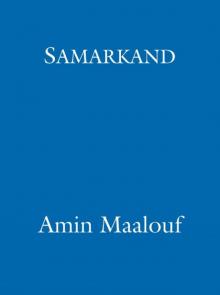 Samarkand
Samarkand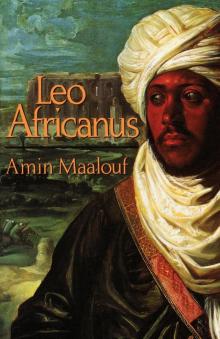 Leo Africanus
Leo Africanus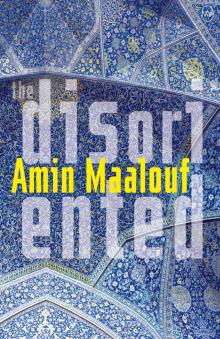 The Disoriented
The Disoriented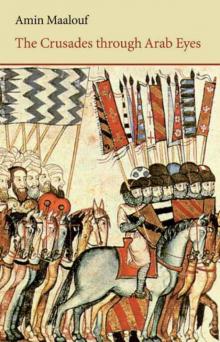 The Crusades Through Arab Eyes
The Crusades Through Arab Eyes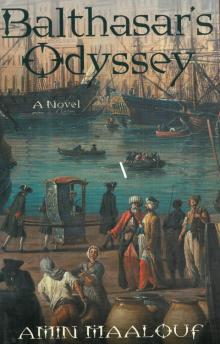 Balthasar's Odyssey
Balthasar's Odyssey